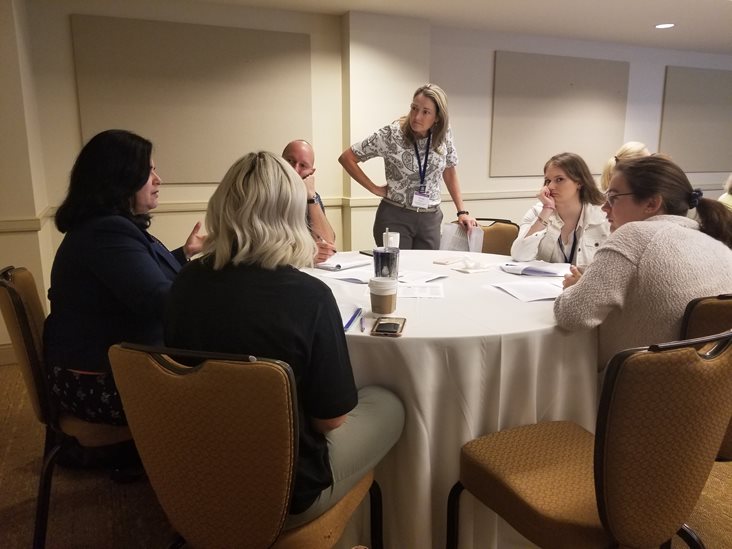UTeach Conference: Elevating STEM Education
Angela Chambers |
May 24, 2019

Jonathan Broussard received an acceptance letter to medical school, initially thinking that was his future. After joining the UTeach program, he realized an important point.
“As a student teacher, I learned I can be a scientist and a teacher and don’t have to give up academic pursuits,” says the Austin High School physics and research initiative instructor. Thanks to this experience, Broussard understands the value of STEM teaching as a STEM career. He shared his insights with fellow teachers during a panel discussion at the UTeach Conference this week in Austin. Hundreds of teachers and college students from across the country gathered to exchange knowledge about producing high-quality STEM educators.
The topic of seeing teaching as a respected profession came up in multiple sessions, including the “Elevating STEM Education” workshop led by NMSI staff and Steve Case, co-director of UKanTeach.
Jeffrey Carver, director of the K-12 STEM Education Initiative at West Virginia University, says a college professor once commented, “Jeffrey, you’re so smart. Why are you going to be a teacher?” His reaction: If we don’t have intelligent teachers, we’re not going to have intelligent students. Adding a comment about public perception, Sara Harmon, program manager at the University of California, Berkeley, shares, “If you don’t value people knowing something, then you aren’t going to value the people helping them know something.” Case added, “Society is confused about us. People will say, ‘I love my teacher and school, but public education is a mess.’ It’s all over the place.”
During the workshop, participants talked about seven characteristics of professionals. Two in particular – authority over decision-making and compensation levels – were discussed in length. Participants lamented a common challenge that comes up when school boards make STEM curriculum decisions without the benefit of STEM teaching knowledge or experience. Regarding compensation, most agreed with Ruthanne Thompson, co-director of Teach North Texas, who says, “It’s not the starting [teacher] salary, it’s the potential for growth. I don’t think it’s anywhere near where it needs to be.”
Summarizing their crucial role, NMSI CEO Bernard Harris, a former astronaut, says, “Teachers are the foundation of what makes this country what it is.”
A potential solution for elevating the teaching profession came from Edna Schack, co-director of MSUTeach. She says Kentucky recently restructured teaching to give educators titles and new responsibilities throughout their careers. Clusters of teachers work together, with more senior teachers mentoring the newer ones. There’s potential for more leadership roles within and outside the clusters as they develop.
Joining Broussard in the “Building Teacher Leaders” panel, Zoe Rothenberger, an algebra and computer science teacher at Meridian School in Round Rock, Texas, says another way to elevate teaching is providing new teachers with more support. During her first year of teaching, she was observed once and not given much feedback. Administrators mentioned the short observation was a “good thing because we think you’re a good teacher.” Lowery doesn’t see it that way. “Teachers need to watch others teach,” she says. “That’s how I become a better teacher.” She welcomes as much feedback as she can get and is thankful for being selected as a Knowles Teaching Initiative fellow, which gives her four additional observations during the school year.
On the last day of the three-day conference, Mariam Manuel, science master teacher of teachHouston, shared the upcoming plans for a UTeach Days on the Hill in Washington, D.C., June 3 to 5, when participants will speak with members of Congress about UTeach recruitment, retention and impact. Contact Manuel if you’d like to join.
Asked what she wants to accomplish in her career, Kira Lowery, a science teacher at NYOS Charter School in Austin and a UTeach Maker fellow, says, “I really want to change education. I feel like I’m sitting in a place where I see the harm being done to students. I can’t sit around and watch this anymore. I have to do something.”
UTeach brings together resources for colleges of education and sciences to prepare undergraduates who are pursuing STEM degrees for careers in secondary education. It began at The University of Texas at Austin in 2007 and has expanded to 45 universities in 22 states and Washington, D.C. Learn more about the program.